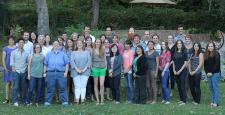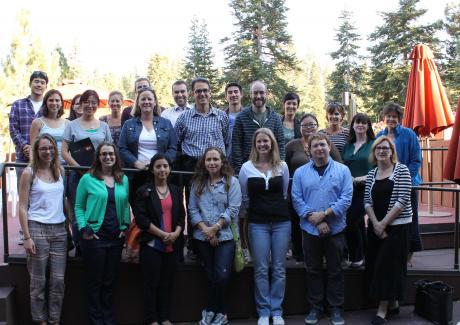Graduate Student Affiliates Win Prestigious Fellowships for their Research on Poverty
June 30, 2015
DAVIS, Calif. — UC Davis graduate students affiliated with the Center for Poverty Research have recently won a number of prestigious fellowships for their research.
This year, fellowships graduate student affiliates have won include the UC Davis Provost’s Fellowship in the Arts, Humanities, and Social Sciences; National Academy of Education/Spencer Foundation dissertation fellowships and the American Sociological Association Minority Fellowship.
“These awards recognize the high-quality research our students are already producing in the areas of poverty and inequality,” says Ann Stevens, the director of the Center for Poverty Research.
The center’s graduate student affiliates receive funding as graduate student researchers while receiving training and mentorship from the center’s faculty affiliates. They also have access to the center’s conferences, seminars and the annual graduate student retreat.
“Training and mentoring of students is at the core of the Center’s mission because everyone recognizes that the difficult problems of poverty and inequality in the U.S. are not going to be solved quickly,” said Stevens.
Brian Halpin, a Ph.D. candidate in sociology won a Provost’s Fellowship in the Arts, Humanities, and Social Sciences. In 2014 Halpin co-authored a Center for Poverty Research policy brief on low-wage workers and the conditions of their jobs with his faculty mentor Victoria Smith, who is a professor and the current chair of the Department of Sociology. The fellowship will give him a year to just work on his dissertation.
When the program was founded in 2012, UC Davis Graduate Studies Dean Jeffery C. Gibeling said, “These fellowships are already having a significant positive impact on the quality of graduate education in the arts, humanities and social sciences. In turn, this investment will enhance the overall quality and excellence of UC Davis by strengthening graduate education.”
“For me,” said Halpin, “the part of the research I really like is getting to know people to understand their particular situation. Getting that understanding of the human element through in-depth interviews is probably the best part.”
This year’s winners of Provost’s Fellowships also include center graduate affiliates Diane Charlton from the Department of Agricultural and Resource Economics and Chloe East from the Department of Economics.
Na’ama Shenhav and Michel Grosz, both Ph.D. candidates in the Department of Economics, won National Academy of Education/Spencer Foundation dissertation fellowships. This fellowship supports work on dissertations that bringing fresh perspectives on education. This year, the Academy anticipated 600 applications nationally for about 30 fellowships.
“The Center for Poverty Research has been a great resource for my development as a researcher,” said Shenhav, “both as a source of funding for collaborative work with professors as well as through the community of researchers who have provided valuable input for my work.”
Grosz said, “With the center I have really benefited from meeting other researchers. One of the most exciting parts of the NAEd/Spencer Fellowship will be its retreats and meetings for fellows from this and the previous years. I’ll also get mentorship from members of the National Academy of Education.”
Emerald Nguyen, a Ph.D. candidate in the Department of Sociology won an American Sociological Association Minority Fellowship. She is currently working on a policy brief with professor of sociology Ming-Cheng Lo, her faculty mentor.
“The center puts me in a favorable position to communicate my research findings to a larger audience of researchers and policymakers,” said Nguyen. “This can create one link in a larger chain of action to influence policy matters that affect immigrant and native-born families.”
“Investing in students, even more so than investing in current faculty research,” said Stevens, the center’s director, “helps insure that we will have a new generation of scholars coming out of UC Davis who are well informed, well trained, and will continue to produce cutting-edge research on poverty and inequality.”










